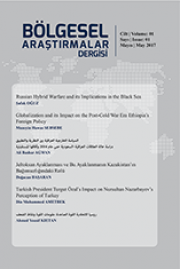Jeltoksan Ayaklanması ve Bu Ayaklanmanın Kazakistan’ın Bağımsızlığındaki Rolü
Jeltoqsan Rebellion and This Rebollion of Stamp to Khazakhstan’s Independence
Author(s): Doğacan BaşaranSubject(s): Civil Society, Politics and Identity
Published by: Mehmet Seyfettin Erol
Keywords: Kazakhstan; Jeltoqsan; Independence; Rebellion; Soviet Union;
Summary/Abstract: Gorbachev, on 16 December 1986, by signing an application that created contradiction to the discourse of participation of folks in management, which is discussed in policy of perestroika, dismissed Dinmuhammed Kunayev who is a Kazakh Turk, from General Secretary of the Kazakhstan Communist Party under various pretexts of claims of corruption; and instead, appointed Gennedy Kolbin who is a Russian. This appointment led to the formation of a huge response which put forward nationalist character in Kazakhstan. Based on this response, demonstration of large-scale protests which was prominent for its nationalist characteristic and included the demand for independence took place for the first time in the history of the Soviet Union. Kazakh Turks, who exhibited peace in their protests and did not abandon their democratic demands despite liberationist discourse, witnessed a major paradox in an environment where perestroika policy is discussed and were distributed mercilessly by being engaged in violence that could be called state terror. Even though the Soviet government suppressed the protests by using violence in 1986, the protests of Jeltoqsan had been the beginning of the process of national independence of Kazakh Turks and Kazakhstan declared its independence five years later.
Journal: Bölgesel Araştırmalar Dergisi
- Issue Year: 1/2017
- Issue No: 1
- Page Range: 57-88
- Page Count: 32
- Language: Turkish

